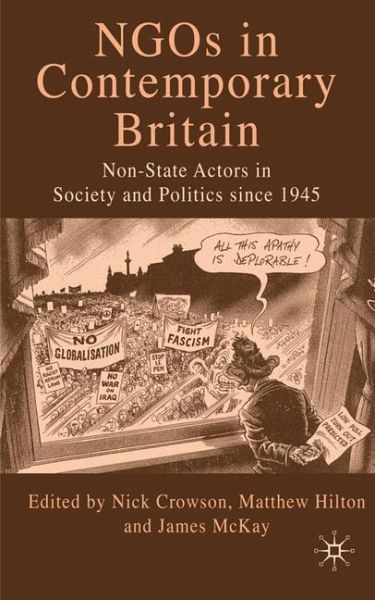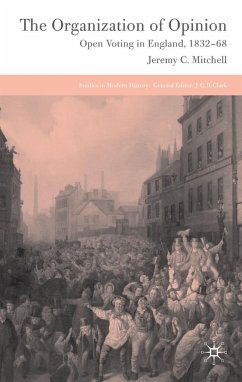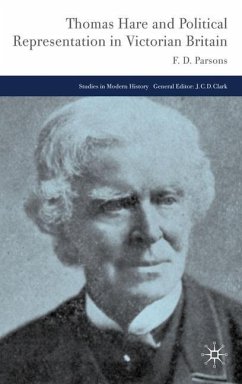
Gebundenes Buch
NGOs in Contemporary Britain
Non-state Actors in Society and Politics since 1945
Herausgegeben: Crowson, Nick; Hilton, Matthew; McKay, James
Versandkostenfrei!
Versandfertig in 6-10 Tagen

PAYBACK Punkte
38 °P sammeln!





Examining the history of social movements and non-state socio-political action, this volume shows how Non-Governmental Organisations (NGOs) have proliferated in Britain since 1945, and how they have raised new political agendas, revived associational life, and arguably re-politicized generations disillusioned with the politics of the ballot box.
MATT ANDERSON Doctoral Graduate, the University of Birmingham, UK CAITRIONA BEAUMONT Senior Lecturer in Social History, London South Bank University, UK LAWRENCE BLACK Senior Lecturer in Modern British History, Durham University, UK STEPHEN BROOKE Associate Professor of History, York University, Toronto, Canada TOM BUCHANAN Reader in Modern History, the University of Oxford, Department for Continuing Education, UK JODI BURKETT Doctoral Candidate, York University, Canada NICK CROWSON Reader in Contemporary British History, the University of Birmingham, UK TANYA EVANS Research Fellow at Macquarie University, Sydney, Australia DARREN HALPIN Reader in the Department of Public Policy, The Robert Gordon University, UK MATTHEW HILTON Professor of Social History, the University of Birmingham, UK JAMES MCKAY Postdoctoral Research Fellow, the University of Birmingham, UK AUDRA MITCHELL Doctoral Candidate, the Queen's University of Belfast, UK ALEX MOLD Lecturer in History, the Centre for History in Public Health, London School of Hygiene and Tropical Medicine, UK CHRISTOPHER ROOTES Professor of Environmental Politics and Political Sociology, University of Kent, UK CLARE SAUNDERS Lecturer / RCUK Fellow in Politics, the University of Southampton, UK ROB SKINNER Department of Historical Studies, the University of Bristol, UK MATTHEW WAITES Lecturer in Sociology, the University of Glasgow, UK
Produktdetails
- Verlag: Palgrave Macmillan / Palgrave Macmillan UK / Springer Palgrave Macmillan
- Artikelnr. des Verlages: 978-0-230-22109-3
- 2009
- Seitenzahl: 316
- Erscheinungstermin: 22. April 2009
- Englisch
- Abmessung: 222mm x 145mm x 22mm
- Gewicht: 514g
- ISBN-13: 9780230221093
- ISBN-10: 0230221092
- Artikelnr.: 25901644
Herstellerkennzeichnung
Springer-Verlag GmbH
Tiergartenstr. 17
69121 Heidelberg
ProductSafety@springernature.com
'The volume brings together fourteen excellent chapters by younger and more senior scholars, and this short review cannot do justice to the conceptual sophistication and empirical diversity of all its individual contributions. . . . This book is one of the very few edited collections in which the whole is more than its constituent parts. And it is an indication of the high quality and coherence of the volume's contributions that it provokes a series of questions that might lead to a more general debate about the key themes of contemporary British history.. In short, this book offers an extremely valuable compendium to a much neglected, yet extremely important part of contemporary British history and deserves a large readership.' Holger
Mehr anzeigen
Nehring, Twentieth-Century British History
'This book seeks to rectify a relative neglect of socio-political action by historians. It does so through a series of appropriately selected and well executed case studies of particular organisations or movements. . . . This book raises as many questions as it answers, but that is a sign of strength rather than weakness and hopefully it will encourage further research in this area.' Wyn Grant, Contemporary British History
'This is the first book-length analysis of one of the key features of post-1945 Britain: the proliferation of NGOs. . . . As the cover illustration suggests, the idea that the British are apathetic about how the world is run is difficult to reconcile with the scale and diversity of this activity. Neither the current political claims about 'broken Britian', nor historical narratives about the welfare state largely ending the role of the voluntary sector should survive a reading of this book. . . . Overall, this is an innovative and informative collection, which lays the basis for much more work on the significance of these bodies for our understanding of democracy and its workings in modern Britain.' Jim Tomlinson, British Scholar
'NGOs in Contemporary Britain brings together a fascinating collection of case studies through which to contextualize changing understanding of what constitutes political activism. . . . As a collection [it] contains contributions that encompass the formal and informal, local and global, structured and voluntary, secular and religious, the everyday and the spectacular, reformist and more radicalized that together encompass the diversity of the term NGO, while managing not to lose all sense of the meaning of the term. It is a weight that the term appears largely able to bear.' Lucy Robinson, Economic History Review
'This book seeks to rectify a relative neglect of socio-political action by historians. It does so through a series of appropriately selected and well executed case studies of particular organisations or movements. . . . This book raises as many questions as it answers, but that is a sign of strength rather than weakness and hopefully it will encourage further research in this area.' Wyn Grant, Contemporary British History
'This is the first book-length analysis of one of the key features of post-1945 Britain: the proliferation of NGOs. . . . As the cover illustration suggests, the idea that the British are apathetic about how the world is run is difficult to reconcile with the scale and diversity of this activity. Neither the current political claims about 'broken Britian', nor historical narratives about the welfare state largely ending the role of the voluntary sector should survive a reading of this book. . . . Overall, this is an innovative and informative collection, which lays the basis for much more work on the significance of these bodies for our understanding of democracy and its workings in modern Britain.' Jim Tomlinson, British Scholar
'NGOs in Contemporary Britain brings together a fascinating collection of case studies through which to contextualize changing understanding of what constitutes political activism. . . . As a collection [it] contains contributions that encompass the formal and informal, local and global, structured and voluntary, secular and religious, the everyday and the spectacular, reformist and more radicalized that together encompass the diversity of the term NGO, while managing not to lose all sense of the meaning of the term. It is a weight that the term appears largely able to bear.' Lucy Robinson, Economic History Review
Schließen
Für dieses Produkt wurde noch keine Bewertung abgegeben. Wir würden uns sehr freuen, wenn du die erste Bewertung schreibst!
Eine Bewertung schreiben
Eine Bewertung schreiben
Andere Kunden interessierten sich für













